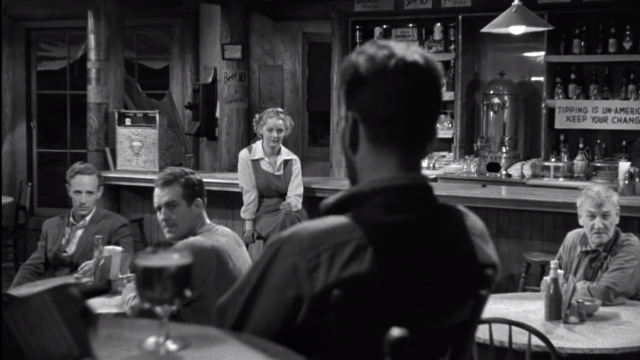“I know there’s something in you. I wish I could figure out what it is.”
Marlon Brando said that on stage, an actor has to show their character – to demonstrate their thoughts – and on screen, an actor just has to think it. I don’t think I fully understood what he meant until I saw this film, in which every actor is consciously projecting the thought process of their character. I admit, I have something of a bias against non-Hitchcock American films from the thirties and forties – part of the reason I’ve gotten into this whole Year O’ The Month thing is because it forces me into my cinematic discomfort zone – and I can see that part of the reason is because there’s none of the kind of subtext I appreciate; characters simply announce what they think, and that makes me feel bored. It’s a little ridiculous because there are, in fact, many people who simply announce what they think, but it’s also ridiculous because it presumes there can’t be movies that are about the process of thinking. One of the side effects of coming to appreciate surface details is recognising the large variety of things that can appear in subtext. Our hero, Alan (Leslie Howard), is a man who collects thoughts with great enthusiasm, even from the talkative old man who is almost definitely at minimum exaggerating his life story; our heroine, Gabrielle (Bette Davis), is enchanted by him because she’s just as enthusiastic about collecting thoughts but has been trapped in a closed circle almost all her life. He is, in part, a fascinating source of new and interesting thoughts, and the person she wishes she could be. For his part, Alan is a man whose greatest ambition is to change the world with the right combination of words – to have people react to one of his thoughts the way he has reacted to others. In this context, his action at the end of the movie is to introduce many wonderful thoughts to the world second-hand using only his name.
What I really appreciate, though, is how not all the characters are beholden to the curiosity of the story and the heroes. The film quickly introduces Boze (Dick Foran), a dimwitted jabroni who has never even considered the idea that other people might have thoughts, let alone exhibited curiosity about them, and it’s interesting how the movie frames him as a bad person without making him feel like a Bad Guy. One of the things that bothers me about the movies of Paul Feig is that the misogynists he makes feel like checklists of bad behaviour he heard about that he then righteously punishes, and he puts his thumb on the scale so hard that it feels false; Boze manages to do every #MeToo complaint short of flash his dick in the first ten minutes and his climactic action is to get himself shot trying to be a hero, and this all feels like a logical extension of a real person’s motivation. The Petrified Forest makes his actions look worse by playing entirely fair with him. Then there’s the villain, Duke (Humphrey Bogart), who also completely lacks curiosity about what other people think but is smart enough to know that any one of these people could be carrying a thought that will completely wreck his already precarious situation; his behaviour reminds me of Major Warren in The Hateful Eight, absolutely refusing to give anyone even a single chance to kill him. Alan and Gabrielle think of empathy as a divine process and Duke thinks of it as a practical tool. The movie ends with it used as both, when Alan appeals to Duke’s pragmatism to make his heroic sacrifice.


